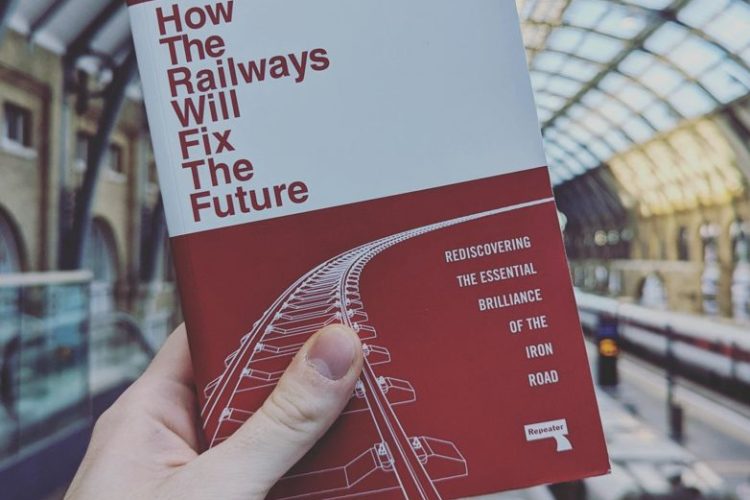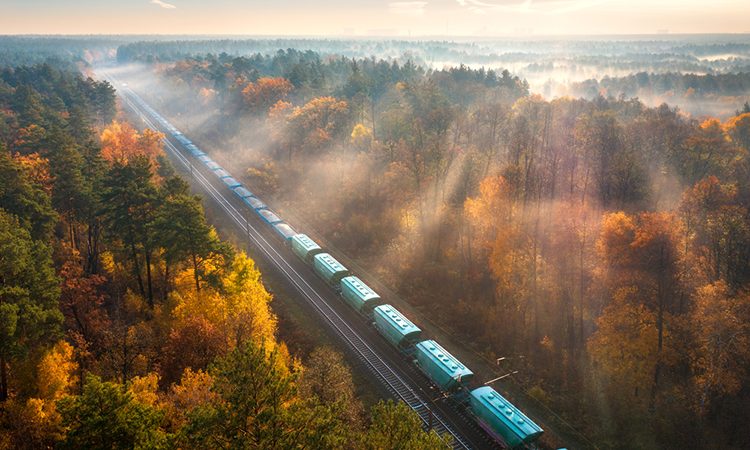Rail Review: Gareth Dennis’ new book “How The Railways Will Fix The Future”
Posted: 25 November 2024 | Diccon Spain - Bring Back Euro Trains | No comments yet
Diccon Spain, Political Liaison Officer at Bring Back Euro Trains, reviews the latest literary release from railway engineer, speaker and writer, Gareth Dennis, entitled: ‘How The Railways Will Fix The Future: Rediscovering the Essential Brilliance of the Iron Road’.


From the very first few pages of Gareth Dennis’s book ‘How The Railways Will Fix The Future: Rediscovering the Essential Brilliance of the Iron Road’, I found myself nodding in agreement with his insights. Already, not that far down the track, on page vii, Dennis articulates perfectly what I have believed for some time: that we are equal to the “complex, multifaceted and interlinked challenges” we face and that “humanity has all the skills and tools to tackle this burgeoning omnithreat today…”, if we can tap into our capabilities.
How do we unlock this potential when, as Dennis argues, our current economic frameworks seem designed to maintain the status quo rather than enable transformative change?
But could railways, a transport technology that came into its own during the Industrial Age, really hold the key to fixing our future? Dennis makes a compelling case that railways – capable of carrying tens of thousands of people per hour or tens of millions of tonnes of freight per year on two strips of steel rail – remain our most powerful yet underutilised tool for societal transformation. But how do we unlock this potential when, as Dennis argues, our current economic frameworks seem designed to maintain the status quo rather than enable transformative change?


This single mechanism – mandating specific increases in rail’s share of passenger and freight transport – becomes his lever for systemic change. For the UK, he proposes ambitious but achievable goals: increasing rail’s share of passenger transport to 25% (a 250% increase) and freight to 40% (a 500% increase) by 2050.
The power and usefulness of such legally-binding targets isn’t theoretical. Dennis points to the UK’s Climate Change Act 2008 – the world’s first national legislation setting a comprehensive framework for climate action – as a model for how targeted legislation can drive systematic change. Just as the UK Parliament’s Climate Change Committee provides oversight and maintains momentum for carbon reduction using carbon budgets, Dennis envisions modal shift targets, similar oversight, transparency and deep public engagement creating similar accountability for transport transformation. He argues that the measurable, targetable nature of modal shift percentages makes them perfect for monitoring and enforcement at national, regional, and local levels.
The Swiss example he gives in the book proves this isn’t mere theory: their 46% rail freight share and 20% passenger share (compared to the UK’s meagre 12% and 9% respectively) demonstrates what’s possible. Indeed, Switzerland has achieved the second-highest per capita passenger rail usage in the world, after Japan. But Dennis’s vision extends far beyond transport metrics to the human dimension of railway transformation.
His insightful analysis of the skills crisis – with only one UK university offering an undergraduate railway engineering course – becomes a springboard for discussing enormous opportunities. Railways could once again become engines of social mobility through high-skill employment. More than this, they can catalyse broader social improvements, just as the Great Western Railway’s medical fund provided the template that Aneurin Bevan would later expand into the National Health Service. This historical example illustrates Dennis’s broader argument: that railways, properly conceived, planned and implemented, can generate a multitude of expected and unexpected benefits far beyond their primary transport function.
What makes this book exceptional is its combination of consummate railway engineering knowledge and experience with a radical and holistic imagination.
What makes this book exceptional is its combination of consummate railway engineering knowledge and experience with a radical and holistic imagination. Dennis shows how railways could naturally drive sustainability and social progress, arguing that “the railways, like any public service, do not and cannot exist in a bubble, and to be fully unleashed, government needs to be incentivised not to create an economy of individual prosperity, but one of collective prosperity.” His vision for 2100 sees the “great strips of concrete and tarmac highway” that currently dominate our cities transformed into linear parks, new communities, and sustainable transport routes. This isn’t utopian fantasy – Utrecht proves it works. This Dutch city reversed its car-centric trajectory, even restoring a canal that had been filled for a highway. Today, its thriving city centre, prioritising public transport and cycling, demonstrates how modal shift can transform urban spaces into vibrant, accessible communities.


Central to Dennis’s vision is public ownership of the transformation process. “Get the public on side,” he argues, “and positive change is not just probable, it’s inevitable.” His approach balances local accountability with national coordination – devolving powers to where they’re most effectively used while maintaining system-wide technical standards and efficiency. This creates transport systems people have a genuine stake in, not just use.
Dennis’s clear-eyed analysis of current challenges is founded on a deep commitment to maximising the benefits of railways in the service of everyone. While his critique of industry structures and Treasury short-termism is frank, it serves a constructive purpose: showing how different choices could unleash rail’s full potential. His examination of how commercial imperatives often conflict with public benefit – from accessibility solutions to leasing arrangements – illuminates the path to reform. This isn’t a counsel of despair but a handbook for transformation, rooted in the conviction that we can and must do better.
No short review can do justice to the breadth and depth of Dennis’s achievement. You might not expect a book about railways to offer a route-map for tackling existential threats while simultaneously enriching lives and communities, but that’s exactly what he delivers. What sets this work apart isn’t just its analysis of problems – it’s how firmly it focuses on practical, proven solutions we already know how to implement.
Regular listeners to his Rail Natter podcast will be familiar with Dennis’ infectious enthusiasm and evident joy about all things railway-related…
Regular listeners to his Rail Natter podcast will be familiar with Dennis’ infectious enthusiasm and evident joy about all things railway-related, but here he channels that energy into a carefully engineered argument, delivered with precision and accessibility. Different readers will take different things from this book, depending on their own perspective and experience, but all will find it both engaging and empowering. It courageously challenges assumptions while offering practical and pragmatic hope, illuminating new possibilities within reach. Whether or not you agree with every detail, you’ll be glad you read it. Allow it to challenge your assumptions, expand your vision of what’s possible, and then – most importantly – consider what you’ll do next.
About the Author


Diccon Spain is the Political Liaison Officer for the campaign group Bring Back Euro Trains (BBET), a Borough Councillor and a Deputy Group Leader at Ashford Borough Council. He is an advocate for international rail in the UK. He lives and works in the south east of England.


